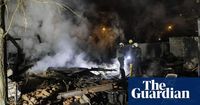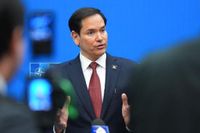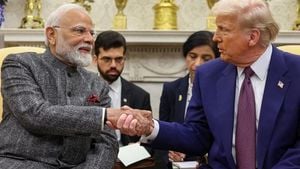On April 4, 2025, U.S. Secretary of State Marco Rubio announced that the United States will soon determine whether Russia is genuinely pursuing peace with Ukraine. Speaking to journalists in Brussels following discussions with NATO allies, Rubio expressed a sense of urgency regarding the ongoing negotiations, stating, "We will know soon enough, in a matter of weeks, not months, whether Russia is serious about peace or not. I hope they are." He emphasized that the U.S. is currently assessing Russia's intentions based on their actions rather than their words.
Rubio's comments come amid growing frustration from U.S. President Donald Trump over the continued military actions from both Russia and Ukraine, despite ongoing mediation efforts. According to a report by NBC News on March 30, Trump is reportedly "pissed off" at Russian President Vladimir Putin for his focus on Ukrainian President Volodymyr Zelensky, which has complicated the peace process. Rubio stated, "If it’s a delay tactic, [Trump]’s not interested in that. We’re testing to see if the Russians are interested in peace. Their actions — not their words, their actions — will determine whether they’re serious or not, and we intend to find that out sooner rather than later."
In the context of these negotiations, Kyiv had initially agreed to a full 30-day ceasefire during U.S.-mediated talks in Jeddah on March 11, 2025. However, Russia rejected the proposal unless it included conditions that would limit Ukraine's military capabilities, such as terminating foreign military aid. Instead, a partial ceasefire was established, focusing on energy infrastructure and the Black Sea. Just two days later, Zelensky accused Russia of attacking energy facilities in Kherson, prompting calls for a response from Washington. Moscow denied these allegations, with Kremlin spokesperson Dmitry Peskov asserting that Russia had adhered to the agreement but reserved the right to abandon it if Ukraine violated the terms.
The tensions escalated further when Russia accused Ukraine of striking the Sudzha gas metering station in Kursk Oblast, a claim that Kyiv dismissed as a pretext for further aggression. On April 1, Russian Foreign Minister Sergey Lavrov stated that Moscow had sent a list of alleged Ukrainian ceasefire violations to the United States, the United Nations, and the Organization for Security and Co-operation in Europe (OSCE). In response, Zelensky ordered Defense Minister Rustem Umerov to provide Washington with evidence of Russian ceasefire violations. As of now, the U.S. has not reacted to the claims made by either side.
While Trump has occasionally suggested implementing additional sanctions and tariffs on Russia, concrete actions to pressure Moscow have yet to materialize. The U.S. administration appears increasingly impatient with the lack of progress in peace negotiations, as officials recognize that the Kremlin is unlikely to back down from its maximalist demands, which threaten Ukraine's sovereignty.
European allies have been vocal in urging Washington to adopt a tougher stance on Moscow, advocating for a serious commitment to ceasefire negotiations. French Foreign Minister Jean-Noël Barrot stated that Moscow "owes an answer to the United States," which has worked diligently to facilitate mediation efforts. British Foreign Minister David Lammy echoed this sentiment, asserting, "[Putin] could accept a ceasefire now, but he continues to bombard Ukraine, its civilian population, its energy supplies. We see you, Vladimir Putin, we know what you are doing."
German Foreign Minister Annalena Baerbock dismissed Putin's discussions of negotiations as "nothing but empty promises," accusing him of stalling for time by continually raising new demands. In a notable development, a Russian envoy visited Washington this week, marking the first time a senior Russian official has engaged in talks with American counterparts since the onset of Russia's full-scale invasion of Ukraine.
Kirill Dmitriev, the envoy, met with Steve Witkoff, a senior adviser to Trump on Russia negotiations, as well as Rubio at the White House. Dmitriev characterized the meetings as indicative of a "positive dynamic" between the two countries and claimed that progress had been made towards peace in Ukraine. However, Rubio took a more cautious approach, urging Dmitriev to convey a clear message back to Moscow: "The United States needs to know whether you’re serious or not about peace."
Amid these diplomatic tensions, a tragic event unfolded in Ukraine, where a local official was killed in a car bomb attack in the central city of Dnipro. The general prosecutor's office confirmed that Yuriy Fedko, a member of the Dnipro city council, died from injuries sustained in the attack, while his wife remains hospitalized. Since Russia's invasion of Ukraine in February 2022, Kyiv has been linked to several assassination attempts targeting military officials and pro-Kremlin public figures, although it is rare for a Ukrainian official to be killed in such incidents.
As the U.S. navigates this complex geopolitical landscape, the coming weeks will be critical in determining the future of peace negotiations between Russia and Ukraine. With both sides continuing military operations and accusations flying, the path to resolution remains fraught with challenges. The world watches closely, hoping for a breakthrough that could end the ongoing conflict.





